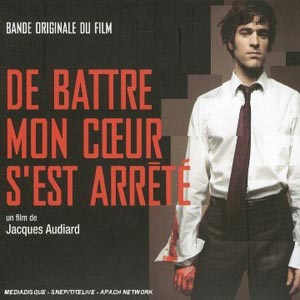De Battre Mon Cúur s'est ArrÍtť (The Beat My Heart Skipped)
Various Artists with ĎDe Battre mon Cúur síest ArrÍtť Suite pour Cordes, Piano, Percussioní composed, orchestrated and conducted by Alexandre Desplat
Performed by Unnamed Ensemble
Available on Naive (ND-68527)
Running Times: 45:04, 23:49
Amazon UK Amazon US

See also:
Syriana Birth I havenít seen Jacques Audiardís 2005 film De Battre mon Coeur síest Arrete (The Beat My Heart Skipped), nor the film it was based on, James Tobackís Fingers. Both films concern a low level hood who rediscovers his passion for piano, the character (played by Harvey Keitel in the Toback version and by Romain Duris here) ill-fatedly attempting to mix the conflicting worlds of mob violence and piano performance. It sounds like an interesting idea, and on the strength of this CD Iíll be checking out the recent version at least for sure.
This is a strange album, coming at regular price but with two discs. The first disc is comprised of forty-five minutes of source cues (and by that I literally mean the music track played in the scene by the character Ė including dialogue), pre-existing pop tracks (a mixture of English and French-language songs), and fresh recordings of piano works by Brahms, Bach and Liszt used in the film. While the classical tracks as performed by Caroline Duris are all worthy, and the pop tracks not exactly bad themselves, this is the kind of disc that would drive most film score collectors mad due to the lack of original score material and the extensive inclusion of dialogue and effects tracks throughout.
Itís the second disc that makes this a special release. It contains a single twenty-four minute cue with the entire original score for the film from Jacques Audiardís regular collaborator, Alexandre Desplat. While the conditions sound less than ideal, this one track is one of the best pieces of film music Iíve ever heard, smoothly editing together the score cues to achieve a devastating extended suite for string orchestra, piano and percussion. Itís the epitome of Desplatís blend of minimalist and romantic writing. The opening sets sparse piano chords in high violins, reminiscent of ĎTake the Target Outí from the composerís score for Syriana. Two ideas are presented by piano Ė a seven note theme and a six note one that are the basis for most of the development that follows.
The tense violin-piano combination is sustained for six minutes, with light percussion adding eerie harmonies to the hypnotic sound. The low strings enter in a short interlude that releases the tension, but tension rises again as the warmer colours of the low strings gather the violins and piano as they go in variations on the basic themes. And the piece develops from there Ė exploring an uplifiting theme, but with subtle dissonances in the high strings signalling fragility. The main ideas become ostinati in the low strings at one point, and later warm major key melodies in the strings. At one point an optimistic melody intervenes, but the darker ideas of the film restore the tension with devastating counterpoint of the two themes, and the piece rounds out with a reprise of the hypnotic opening textures.
It plays like a single moment, a kind of dream. And I love it. I highly recommend the score cue to fans of Desplatís Birth, Syriana (particularly the more textural-electronic cues) and Christopher Youngís The Tower. Desplatís work here particularly brings to mind the Young score, which it resembles in subtle thematic development, though Desplatís orchestration sustains a more riveting contrast of tone colours throughout. It doesnít open up all its secrets on a single listen, but it is a very accessible score that could survive equally well in a concert hall as it does on disc. Sadly the liner notes by director and composer on NaÔveís release are not so accessible Ė being in French. Iíd love to read their motivations for decisions, and particularly whether there was an intended reference to any of the classical tracks on the first disc, so itís a shame to say the least.
Itís an odd album overall. The contents of both discs could have fit on one, but since it wouldnít have saved NaÔve any money to release it this way, I can only assume the album producer felt the two very different sides to the music in this film played better in isolation. Iím inclined to agree. A rare work of quality.
Michael McLennan
Disc One:
2
Disc Two:5
Review copy donated by reviewer. My thanks to David OíConnell for drawing my attention to this work.
Return to Reviews Index